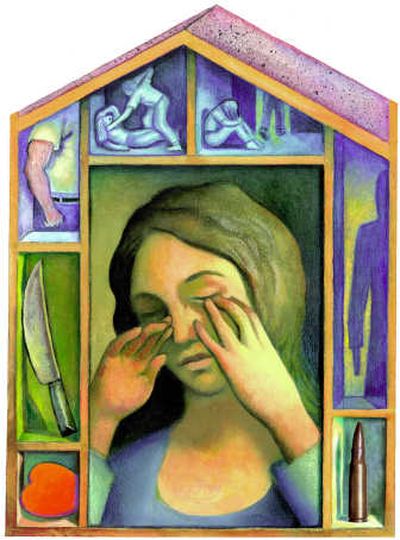Faith & Hope

The women sought help from their pastor, but at the time, the Rev. Dennis Borgman didn’t know what to do.
One by one, they told him about their husbands and marital problems. Some would come to church on Sundays with bruises. Others only hinted at the abuse they suffered at home.
“My first inclination back then was to suggest couples counseling, which is the traditional way, but it was the wrong thing to do,” recalled Borgman, a retired Presbyterian pastor.
Soon after witnessing the effects of domestic violence on women and families, Borgman sought to learn all he could about this problem affecting at least one in every three women around the world. He attended training sessions and workshops. He became a volunteer advocate and got involved with the Faith Trust Institute, an international, multifaith organization working to end sexual and domestic violence. He began to preach about the problem from the pulpit.
These days, Borgman is among a growing number of local pastors and religious leaders working to raise awareness of domestic violence.
On Tuesday evening, members of the region’s faith communities along with many others will take part in the annual march against domestic violence. The event will start with an opening ceremony at the YWCA downtown and conclude at the Cathedral of Our Lady of Lourdes with a prayer vigil and a balloon release to remember victims.
The march is sponsored by Faith Partners Against Domestic Violence, a local organization that provides education, resources and support for faith communities as they help families affected by domestic violence. Faith Partners works with several groups in the area, including the YWCA Alternatives to Domestic Violence, the Presbytery of the Inland Northwest, Jewish Family Services and the Upper Columbia Seventh-day Adventists.
“When people of faith gather in solidarity and take action for justice, the violence can be stopped and these victims can be restored to the full life God intended for them,” said Sandi Thompson-Royer, coordinator for Faith Partners.
One of the organization’s goals is to educate communities of faith so that churches, mosques, synagogues and other houses of worship can be safe places for victims, according to the Rev. Jim CastroLang, acting pastor of Veradale United Church of Christ and a member of Faith Partners.
“We hope to make pastors aware so that they can be helpful and provide the spiritual support that’s compatible with the work that the professionals (who work with victims) do,” he said. “… I call on faith communities to learn how to make their holy places a place that provides safety, healing and hope to all victims.”
Many pastors miss the signals and don’t often recognize abuse, said Borgman, who worked as a pastor in the northeastern Washington towns of Republic and Curlew. Domestic violence was never talked about during seminary training, he said. In many churches, the topic remains taboo.
“I didn’t know how to help,” he said, recalling the first time he encountered the problem when he became a pastor in the mid-1980s. “What I was doing wasn’t helping. The couples couldn’t be honest with me. The abusers were usually pretty good at minimizing or flat-out denying the abuse and I could see that the women were afraid.”
Some pastors who work with families suffering from domestic abuse advise couples to stay together and work it out, but this can be harmful to the women and children, said Thompson-Royer.
Pastors and other religious leaders are supposed to be there for the whole family – for the victims and the perpetrator, she said. That creates a dilemma for some and many don’t know what to do to ensure the safety of the people being abused. That’s why Faith Partners provides resources for church leaders and congregations to protect the abused and to hold the abuser accountable, said Thompson-Royer, who has spent more than 20 years working in the domestic violence movement.
When Borgman began attending workshops on domestic violence, he quickly became aware of issues involving power and control. He also learned that negotiation and compromise, lessons that are often emphasized during couple’s counseling, generally cannot be applied when one person in a relationship is abusing the other.
His advice for other pastors involves getting help from Faith Trust, the YWCA and other resources in the community. Borgman also emphasized the need for religious leaders to believe victims when they come forward and share their stories of abuse. The highest priority, he said, should be their safety.
“Domestic violence happens in every church, and the faith community can either be a resource or a hindrance,” Borgman said. “We need to break the silence. Violence is not God’s plan for marriage or any relationship.”
.